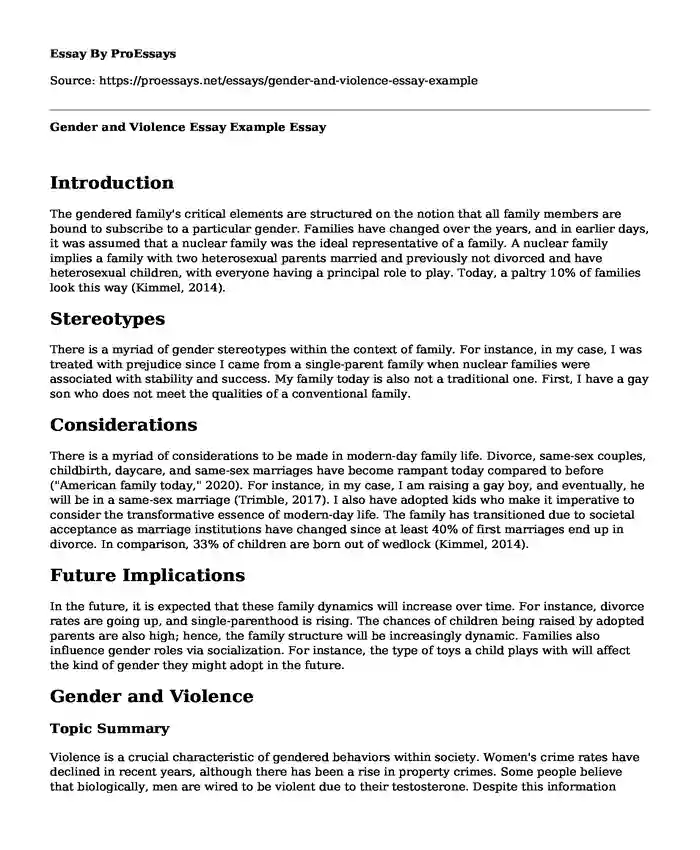Introduction
The gendered family's critical elements are structured on the notion that all family members are bound to subscribe to a particular gender. Families have changed over the years, and in earlier days, it was assumed that a nuclear family was the ideal representative of a family. A nuclear family implies a family with two heterosexual parents married and previously not divorced and have heterosexual children, with everyone having a principal role to play. Today, a paltry 10% of families look this way (Kimmel, 2014).
Stereotypes
There is a myriad of gender stereotypes within the context of family. For instance, in my case, I was treated with prejudice since I came from a single-parent family when nuclear families were associated with stability and success. My family today is also not a traditional one. First, I have a gay son who does not meet the qualities of a conventional family.
Considerations
There is a myriad of considerations to be made in modern-day family life. Divorce, same-sex couples, childbirth, daycare, and same-sex marriages have become rampant today compared to before ("American family today," 2020). For instance, in my case, I am raising a gay boy, and eventually, he will be in a same-sex marriage (Trimble, 2017). I also have adopted kids who make it imperative to consider the transformative essence of modern-day life. The family has transitioned due to societal acceptance as marriage institutions have changed since at least 40% of first marriages end up in divorce. In comparison, 33% of children are born out of wedlock (Kimmel, 2014).
Future Implications
In the future, it is expected that these family dynamics will increase over time. For instance, divorce rates are going up, and single-parenthood is rising. The chances of children being raised by adopted parents are also high; hence, the family structure will be increasingly dynamic. Families also influence gender roles via socialization. For instance, the type of toys a child plays with will affect the kind of gender they might adopt in the future.
Gender and Violence
Topic Summary
Violence is a crucial characteristic of gendered behaviors within society. Women's crime rates have declined in recent years, although there has been a rise in property crimes. Some people believe that biologically, men are wired to be violent due to their testosterone. Despite this information lacking scientific proof, societies with increased gender inequality are indeed more vulnerable to violence.
Stereotypes
Men are generally raised to be violent within society. This situation emanates from societal expectations, as evidenced by Jennifer Siebel Newsom 2015's The Mask You Live In, a documentary that depicts how society influences men into crime. Men are raised not to be weak, and not to be vulnerable to emotions pushes them into violence as they grow to be competitive, angry, and violent. Men are told, "do not cry, you are a man!" and eventually grow to be nonchalant and violent.
Considerations
The fact that boys are taught to be inflexible and inconsiderate to their emotions and eventually end up violent shows that different lessons would create different results. Today both men and women are exposed to gender violence (Whitley, 2019). For instance, if boys are not pushed towards the glorification of violence, they will grow up differently. As a parent to both boys and girls, I am more attuned towards gender equality as I would hate any mistreatment of my children.
Future Implications
A change in what boys learn will push them to be in touch with their emotions. For instance, if boys watch more emotionally appealing films rather than war movies, they could acquire feelings about treating others in the best way possible. Therefore, we should change what we teach our boys and girls to be aligned to gender equality and respect to across both genders.
References
Kimmel, M. S. (2014). The gendered society. Oxford University Press, USA. The American family today. (2020, May 30). Pew Research Center’s Social & Demographic Trends Project. https://www.pewsocialtrends.org/2015/12/17/1-the-american-family-today/
Trimble, M. (2017). Same-Sex Marriage Legalization by Country. US News. Retrieved December 9, 2020, from https://www.usnews.com/news/best-countries/articles/2017-11-15/where-same-sex-marriage-has-been-legalized-around-the-world
Whitley, R. (2019, November 19). Domestic violence against men: No laughing matter. Psychology Today. https://www.psychologytoday.com/us/blog/talking-about-men/201911/domestic-violence-against-men-no-laughing-matter
Cite this page
Gender and Violence Essay Example. (2024, Jan 26). Retrieved from https://proessays.net/essays/gender-and-violence-essay-example
If you are the original author of this essay and no longer wish to have it published on the ProEssays website, please click below to request its removal:
- Justification for Formation of Counseling Group to Assist Students Struggling with Alcoholism
- Rich and Poor Kids Essay
- Ramifications of Biased Media Coverage Paper Example
- Essay Sample on Personal Communication Style
- Essay Example on Rise of Tech: Disrupting Social Processes & Equality
- Child Labor: A Controversial Issue in the US - Essay Sample
- Essay Example on Discrimination in U.S. and Abroad: Pre-Civil War to Present







